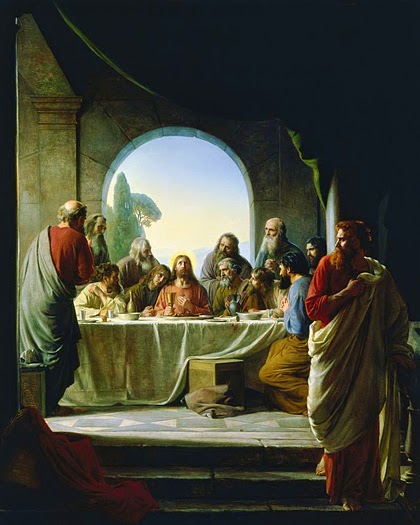At the Cross her station keeping,
Stood the mournful Mother weeping,
Where he hung, her dying Son.
Through her soul, of joy bereavèd,
Torn with anquish, deeply grievèd,
Lo! the piercing sword hath run.
O, how sad and sore distressèd
Then was she, that Mother blessèd
Of the sole-begotten One!
Torn with grief and desolation,
Mother meek, the bitter Passion
Saw she of her glorious Son.
Who, on Christ’s dear Mother thinking,
With her Son in sorrow sinking,
Would not share her sadness deep?
For his people’s sins chastisèd,
She her Jesus saw despisèd,
Saw him by the scourges rent.
Saw her own sweet Offspring taken,
And in death by all forsaken,
While his spirit forth he sent.
Mother, fount of love o’erflowing,
Ah, that I, thy sorrow knowing,
In thy grief may mourn with thee.
That my heart, fresh ardour gaining,
Love of Christ my God attaining,
Unto him may pleasing be.
Holy Mother, be there written
Every wound of Jesus smitten
In my heart, and there remain.
As thy Son through tribulation
Deigned to purchase my salvation,
Let me share with thee the pain.
Let me weep with thee beside him
For the sins which crucified him,
While my life remains in me.
Take beneath the Cross my station,
Share with thee thy desolation,
Humbly this I ask of thee.
Virgin, virgins all excelling,
Spurn me not, my prayer repelling:
Make me weep and mourn with thee.
So Christ’s death within me bearing,
Let me, in his Passion sharing,
Keep his wounds in memory.
Let thy Son’s wounds penetrate me:
Let the Cross inebriate me
And his own most precious blood.
Lest in flames I burn and perish,
On the judgement day O cherish
And defend me, Virgin good.
Christ, whene’er this world shall leave me,
Through thy Mother then receive me
To the palm of victory.
When the bonds of flesh are riven,
Glory to my soul be given
In thy Paradise with thee.
_________________________________
Image: "Christ on the Cross with Mary and John mourning"
by Rogier van der Weyden (1399-1464)













